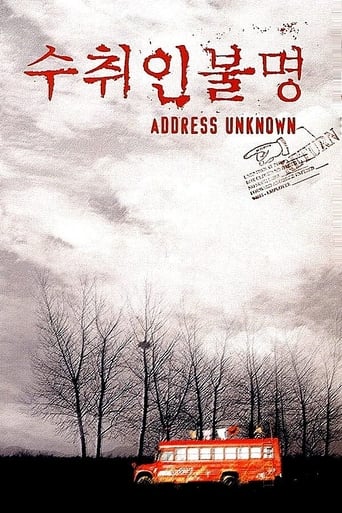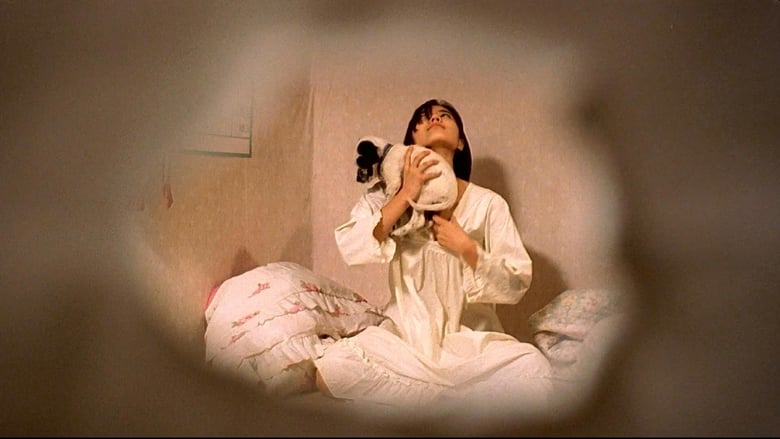Address Unknown (2001)
Romances end in blood and the frail hopes of individuals are torn apart in a vile karmic continuity of colonialism, civil war and occupation. After surviving Japanese colonization, Korea became the first war zone of the Cold War. The legacy of war remains today in this divided country.
Watch Trailer
Cast


Reviews
Wonderful character development!
So much average
Great Film overall
Exactly the movie you think it is, but not the movie you want it to be.
A bit of a goofy movie here that supposedly explores the relationship of the Korean People to G.I.'s when the Korean War was going on, but it's all a bit too melodramatic, goofy and over the top to ever take seriously. A motley of Korean lower-class decrepit people try to get by on what they have, one of them harvests dog meat, a kid is ostracized because he's half Black, another has eye problems etc. It's somewhat interesting, maybe a tad overacted, but that all is forgiven when an actor billed as Mitch Mahlum screeches everything to a halt with his performance as a GI who falls in love with the girl with eye problems. He is just SO BAD. I can understand Asian directors maybe having difficulty with American actors because of the language barriers, but Mahlum just fails in all aspects, line delivery, mannerisms, and just EVERYTHING. Just horrible. But funny bad horrible. Yay!
This is gritty and bleak realism at its best. We are in a countryside village on the border to North-Korea were poverty and war (both the Korean war and the continuation of the cold war) takes its toll on the villagers. Prospects are none, but some think of America as one and therefore learns English. This also provides some of the small pieces of comedy in the movie, for example when some youngsters try to translate from a hustler magazine or when two bullies are tough with speaking English with strong Korean accent; Koreans have trouble pronouncing f for instance.. Some other comedy is the US army battalion running and crawling everywhere and the war veteran crazy for medals always bragging about killing 3 commies.Anyway this very grim and bleak realism is obviously made as a political commentary. I don't blame any of them, they are victims of their circumstances. I sympathize with every one of them. Kim Ki-Duk don't blame anyone either, the Americans are portrayed as human, not as heroes nor devils, but the theme of globalization and colonization still lies implied in the movie. Actually its full of commentary. I wont get into it here.I know there's a big difference between countryside Korea and big city Korea, but even though I cant say if its real or not, I believe this to be quite realistic. The utter consequences the movie depicts of course is fiction and made to emphasize the horror and drama, this is a movie after all.This was not very well received in Korea and understandably so, it takes up problems that are very actual today and brings up a painful past. To get rid of these problems it is very important however, that someone like Kim Ki-Duk makes these kind of movies and for people to see them. So go see it!! But its not a pleasant watch.
South Korean films are hard to get used to. They're laborious to witness and completely uninterested in pacing. I've found this to be the case in 9 out of every 10 Korean films that I have seen, and I have seen a LOT of them. For the most part, South Korean dramas are made for the art house audience, the same one that goes gaga over "The Hours" and the like. That is to say, if you like misery piled on top of misery sandwiched in between more misery so you can "feel intelligent", then this film, and others of its ilk, is your cup of tea. I have seen a lot of artsy film from South Korea and enjoyed many of them. "Sopyonje", a film that has relatively few moments of joy, ranks as my favorite film of al time. This movie, though, is just tedius and bored. It shouldn't surprise any viewer that American soldiers come across as worst than Satan in this movie, because the writer/director has probably NEVER MET a real American in his life. Judging by the American dialogue and "characters" here, this seems to be the case. Then again, I'm sure American films don't do justice to Korean characters, but that's neither here nor there. In any case, "Address Unknown" is a useless movie that provides nothing to the world at large.
Call me strange, but Kim Ki-Duk's THE ISLE is one of my favourite Korean movies. Not just the beautiful imagery, not just those scenes that had people fainting in the theatres, but because I empathised a lot with the characters, and the symbolism of their environment and their actions was very much in tune with my sensibilities. OK, so I'm strange . Much as I enjoyed watching it, I won't try and argue that watching THE ISLE is a 'pleasant' experience - not one to leave you with a smile, so I was prepared for something a little bit serious and grim with ADDRESS UNKNOWN. It is not a little bit serious and grim at all... it is *completely* serious and amazingly grim.Kim Ki-Duk is less interested in exploring the somewhat global issues of human feelings here, but instead wants to explore the feelings of a nation - Korea, still living in the shadow of the Korean war. The characters here come across as a little apersonal (it's ok, I just invented it) because they are embodiments of the country's experience... the division, the loss of autonomy, the dehumanisation that people feel, caught up in the conflicts between North and South and between Capitalism and Communism. Obviously to suggest that this was a universal Korean experience would be unreasonable, though Kim Ki-Duk is not interested in exploring balancing factors in this particular movie. People suffer. And suffer. And suffer. And then they suffer for a while. He is relentless in his examination of the pain that he clearly feels, for himself and for his country.It must be said that I know almost nothing about Korean history (though I am learning a lot as I type!), or of contemporary Korean society, so I don't know how common the feelings that Kim Ki Duk expresses here are, or how realistic his assessment of Korea's post war condition is. It all feels very believable, very convincing... but certainly none of the Korean people I have met are quite as utterly miserable as they must be if ADDRESS UNKNOWN were an accurate depiction of their lives.I think there is no doubt that for at least some people, and some communities, the feelings that Kim Ki Duk brings to the fore in the movie represent real feelings and real situations. But I think that it must be assumed that it is not an even-handed assessment of the situation, that he was quite certain what he wanted to say and permitted no deviation from it. In a way this is the movie's undoing... it is so relentless in its pursuit that it becomes too easy to get detached from it, to treat it as political allegory rather than a tale of human hardship. A little more warmth, a little bit of humour, maybe just one or two moments where at least one character was *slightly* happy... and I would have been much more able to bond with them, and their tragedies and miseries would have been that much more poignant as a result.A fairly small matter, and to a degree this observation may simply be an observation that I am not Korean. The movie is a very personal look at the feelings and circumstances of a nation, and having had no comparable experience myself, it is obvious that I'm going to struggle to fully relate. If I couldn't empathise with the characters though, I could at least sympathise with them. The characters themselves were good characters, and the performances were mostly very good. Notable exceptions are the American soldiers in the movie, whose English dialogue and delivery is really quite embarrassingly bad The movie is very light on dialogue - little that is important is expressed through words, because it doesn't need to be. Always a good thing in a movie.It is the younger characters of the movie that are centre stage, those who were born years after the Korean war ended, but are still suffering its consequences. It's always refreshing to see young actors deliver mature performances, and this is one such example.THE ISLE probably impacted me mostly because of the visuals - the beautifully photographed and haunting environment in which the movie took place. ADDRESS UNKNOWN is not nearly as pretty, which can partly be based on location, but also the fact that the style is a lot more realistic, gritty even, as opposed to THE ISLE's abstractness. It is still well filmed though. I wrote of THE ISLE after seeing it:"if you want to take away the beauty of his film, you have to be willing to pay the price of the horror"ADDRESS UNKNOWN is a less successful movie for me because once you get past it's horror, instead of beauty you find there's just a bit more horror . OK, it's not as bad as that... but the tone is quite unremittingly bleak. I don't know whether to recommend the movie or not. I liked it, but I'm not sure how many others will. Definitely not a movie to put on to take your mind off a troublesome day anyway!







